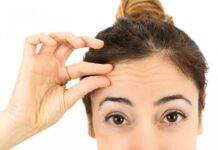Hyperpigmentation is the name of skin disorders like dark patches, uneven skin tone, and darker skin around T-zones. Hyperpigmentation can be mild in some cases and can reach severe conditions if proper care has not been taken or if the appropriate treatment is missing. This hyperpigmentation can be of any type like melasma, post-inflammatory hyperpigmentation, and age spots. There are different causes of hyperpigmentation for different types, and the treatment of them is also varied from person to person.
Here, in this article, we are going to discuss different types, causes, symptoms, treatments, and home remedies of hyperpigmentation that are suggested by the expert dermatologists.
What Is Hyperpigmentation?
When the skin starts to produce excess amounts of melanin, the skin becomes darker in color, and dark patches begin to appear on the skin. This condition of the skin is named as hyperpigmentation by skin experts. This is considered as the normal skin condition that can affect all types of skin when their skin is exposed to direct sunlight and become deficient in some kinds of vitamins and minerals.
Some common types of hyperpigmentation are sunspots and melasma, that skin of the face, neck, arms, and legs can affect. Some other types of hyperpigmentation that our skin might get due to injuries or inflammation like burns, cuts, lupus, or acne. However, some pigmentation that occurs on the skin may not be hyperpigmentation, it may be due to some type of medical or skin condition.
What Are The Causes Of Hyperpigmentation?
Hyperpigmentation can be caused by skin due to several reasons. Most common reasons due to which hyperpigmentation cause on the skin are mentioned below:
- Skin Inflammation: Skin can get dark spots after getting inflammation like acne, lupus, injury, or eczema. Areas of skin become darker when these inflammatory skin issues or injuries get healed.
- Exposure To Sun: When direct sunlight hits the skin, our skin produces extra amounts of melanin to protect skin from sun damage. If you stay out in the direct sunlight, then there might be chances that your skin becomes darker in color and starts getting age spots.
- Melasma: Sometimes, due to hormonal changes, the skin of various people can become darker in color and get patches on it. Such types of patches are common in women during their pregnancy duration.
- Medical Issues: Severe hyperpigmentation can be caused due to medical conditions like hemochromatosis and Addison’s disease. These diseases cause damages to the adrenal glands and cause severe hyperpigmentation on the areas around lips, knees, elbow, cheeks, skin folds, and toes.
- Some Drugs Reaction or Side Effects: Hyperpigmentation can be caused due to the reaction of certain types of medicational drugs like antidepressants and antimalarial meds. The dark patches of pigmentation caused due to these medication reactions turn into gray color spots. Chemicals present in some topically applied meds also sometimes lead to hyperpigmentation.
What Are The Types & Symptoms Of Hyperpigmentation?
There are various Types of Hyperpigmentation that you might be suffering from and unknown what they really are. Here below, we are discussing the Types as well as Symptoms of Hyperpigmentation that might appear on your skin.
- Age Spots: This is a type of hyperpigmentation that can be caused due to direct exposure or more exposure to sunlight. Age spots are also called solar lentigines or liver spots. Symptoms of age spots are tanning, brown color skin, or sometimes black spots that occur after sun exposure. Age spots only appear on the skin areas of the face, limbs, or any exposed part of the body. Usually, age spots mostly occurred in the people of older age, not in the children.
- Post-Inflammatory Hyperpigmentation: This can be mild or severe that might take years of effort to disappear from the skin completely. Symptoms of Post-Inflammatory hyperpigmentation is after the acne, eczema, or injury spots remain and become darker in color. These mostly appear in the skin areas of the neck or face. People who are affected by such hyperpigmentation are dealing with inflammatory problems or may have got any injury in the past.
- Melasma: It is also called as “Mask of Pregnancy” by some skin experts. The symptoms of such hyperpigmentation are the large darkened skin patch. Melasma can affect the areas of skin like face, stomach, or can appear on your forehead. The women suffer this type of hyperpigmentation during their pregnancy time or if they are taking birth control pills. And even can be faced by those people whose skin is darker in color by birth.
Home Remedies For Hyperpigmentation Treatment
If you are suffering from hyperpigmentation and want to make your skin even and supple, here are some natural home remedies for the treatment of hyperpigmentation made with fewer and easily available ingredients. These remedies can help in lightening the skin and remove the skin unevenness gradually with the regular application. However, make sure that you always try a patch test on arms before applying it to the affected area. Here below are three home remedies for hyperpigmentation treatment.
- Apply Green Tea extract on the affected area as green tea contains lots of antioxidants, antifungal, and anti-inflammatory properties. Regular application of green tea extract with cotton balls can help in lightening the dark spots.
- Apply Aloe Vera gel on the affected area, helps in removing the dark spots, and fights against the severity of hyperpigmentation. Aloe Vera contains vitamin E and many antioxidants that help in lightening the age spots, sunburn, and dark patches form due to drug reactions.
- Apply sunscreen before going in the sun and wear a hat to protect face skin from direct sun rays.
- Apply Licorice paste on the affected area as it contains antioxidants, skin-whitening, and anti-inflammatory properties. Take half a spoon of licorice powder, one-fourth spoon of honey, and a few drops of water, mix them well, and apply on the affected area.
Hyperpigmentation Diagnosis
People who suffer from severe pigmentation should consult a specialist doctor, as he may suggest the best treatment and identify your skin issue in a much better way. A specialist doctor or dermatologist takes the sample from your affected skin test to determine the exact cause of the hyperpigmentation.
Doctors know the issue in a much better way; they can diagnose melasma or any other skin conditions just by a single sight on your affected skin. They also use light to examine your skin in a much appropriate manner. Thus, always go to the specialist doctor or dermatologist for the treatment of hyperpigmentation.









![How Old Do You Have to Be to Work at Starbucks? [Details Inside]](https://www.abestfashion.com/wp-content/uploads/2023/02/pexels-photo-303324-100x70.jpeg)










